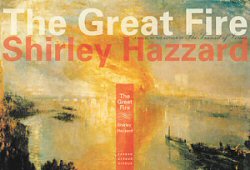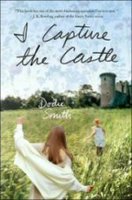The Great Fire
 23 years after her last novel, The Great Fire earned Australian-American author Shirley Hazzard the 2003 National Book Award. The honor is well-deserved.
23 years after her last novel, The Great Fire earned Australian-American author Shirley Hazzard the 2003 National Book Award. The honor is well-deserved.The book begins in the aftermath of the second world war as decorated British officer Aldred Leith arrives in occupied Japan to write about the effects of the bomb at Hiroshima. There he meets Benedict and Helen Driscoll, the delightful son and daughter of a boorish medical bureaucrat and his horrid wife. Antithetic to their parents, Ben (dying, at 20, of a rare degenerative disease) and Helen (younger, and utterly devoted to her brother) are precocious and sensitive, having been, in Leith’s words, “delivered by literature.” (wonderful thought.) Leith develops an intense friendship with the two, and finds himself falling in love with young Helen (beautiful, brainy, elfin—a "changling," he calls her). At which point the book becomes an unabashedly romantic Romeo and Juliet-like love story (a lot more than that too, though), with parents conspiring to keep them apart, and good friends favoring their cause.
The Great Fire takes us back and forth across the globe—Japan, China, Hong Kong, Britain, France, Italy, New Zealand—and is wonderfully atmospheric in each location. Everywhere there is destruction and weariness, squalor (physical and psychological) interspersed with moments of beauty and consolation. Hazzard's style is complex and lucid, with a lovely formality that lends pleasure but requires slow, careful reading. She is at her best when describing the landscapes, scents and colors of her various backdrops. (A sample: “Outdoors, in the squelching world, rain had drawn off into purpled sky; green smells were sharp, chilly wet, delicious.”)
Really, her style isn't particularly contemporary. The book’s sensibilities, reflecting the times and places it evokes, could in fact be called old-fashioned. She is skittish with physicality, illness, violence; horrors of war are only hinted at; private moments between lovers are left just that. While I can imagine some readers seeing her book as an antique, I think Hazzard's reserve is commendable, especially given the novel’s far-flung set pieces and grand themes (impossible loves, striving for human connection in a world shattered by war)—it’s ripe for melodrama and sensationalism, but is entirely without it because her observations are so finely nuanced and so deeply insightful.
If pressed to state a criticism, I wouldn't have to think too hard: dialog in the book tends to read like something written rather than spoken; it's often stilted and unnatural. But that aside, the quality of her writing is extraordinary—careful, lyrical, solemn, beautiful. A line that I enjoyed, to illustrate: Helen calls her brother's attention to a full moon as they contemplate their new friendship with Leith. "Her life, and even his, in the little prison of their rooms, had also rounded and ripened, grown luminous." (Dear Shirley, that’s so lovely.)
What I liked best about this book (besides that Helen is such a remarkable reader!) was the sense that this was a rather personal work stemming from a time and a place which the author herself experienced (which is true); that she finally shared it, in an act of compassion, with a world “entirely charged with human wishes, existing for the most part silently and in vain.” Everyone has a cruel story, one character concludes, and “the entire world needs comforting.” Shirley Hazzard’s extraordinary novel is a gift of hope, as comforting today as it would have been 50-some years ago: a shared wish that love may rescue us all.






